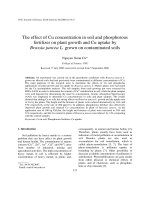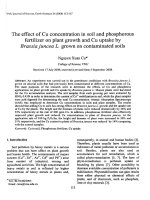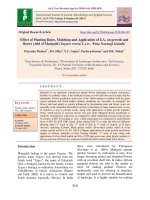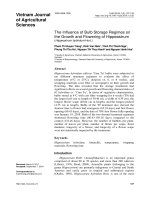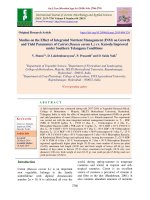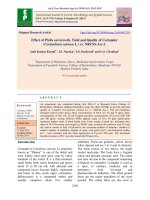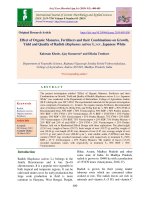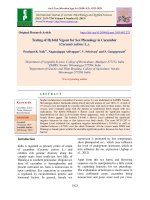Efficacy of plant growth regulators on growth and flowering of cucumber (cucumis sativus l.) cv. malini under shade net conditions
Bạn đang xem bản rút gọn của tài liệu. Xem và tải ngay bản đầy đủ của tài liệu tại đây (245.56 KB, 5 trang )
Int.J.Curr.Microbiol.App.Sci (2019) 8(9): 313-317
International Journal of Current Microbiology and Applied Sciences
ISSN: 2319-7706 Volume 8 Number 09 (2019)
Journal homepage:
Original Research Article
/>
Efficacy of Plant Growth Regulators on Growth and Flowering of
Cucumber (Cucumis sativus L.) cv. Malini under Shade Net Conditions
A. Dinesh1*, P. Prasanth2, D. Lakshminarayana3, K. Nagaraju4 and P. Gouthami5
1
Department of Vegetable Science, 2Department of Floriculture and
Landscaping,3Department of Crop Physiology, College of Horticulture, Mojerla, SKLTS
Horticultural University, Rajendranagar, Hyderabad – 500032, India
*Corresponding author
ABSTRACT
Keywords
Plant growth,
Regulators, GA3,
Salicylic acid,
Cucumber,
Shade net
Article Info
Accepted:
15 August 2019
Available Online:
10 September 2019
An investigation was conducted to study the effect of different plant growth regulators on
growth and flowering of cucumber cv. Malini under shade net conditions. The experiment
was carried out with 10 treatments GA3 at 75, 150 and 250 ppm, Ethrel at 100, 200 and
300 ppm, Salicylic acid at 75, 150 and 250 ppm and control (water spray) in three
replications. Among all, GA3 at 75 ppm recorded with maximum vine length (271.76 cm),
number of number of leaves (90.32), number of nodes on main stem (30.22), length of
primary branches (153.25 cm) and leaf area (458.14 cm²), whereas, maximum number of
primary branches(18.49) was recorded in ethrel 300 ppm. Further, maximum internodal
distance (8.24 cm) was recorded with GA3 at 250 ppm. With respect to phenological
parameters, ethrel at 300 ppm exhibited the best results for the minimum number of days
taken for first female flower appearance (38.88 days), least node number of first female
flower appearance (6.77) and lowest male to female sex ratio (1.40) as compared to other
treatments, whereas treatment GA3 at 150 ppm recorded minimum number of days taken
to initiation of flowering (33.74 days), minimum days taken for 50 per cent flowering
(44.91 days) and time taken for first harvesting (51.80 days) over other treatments and
finally yield (165.17 t/ha) was recorded highest in GA3 75 ppm compared to other
treatments.
scabrous stems with triangular ovate leaves
with acute curves, leaf axils with unbranched
lateral tendrils. As the lateral branches
develop, flower clusters appear at each leaf
axils and the fruits are warty and cylindrical.
However, enhancement in growth and
flowering are important factors for getting
higher yields and returns in any crop, which
will be improved by different horticultural
techniques. Among these use of different plant
growth regulators at appropriate concentration
Introduction
Cucumber (Cucumis sativus L.) is one of the
most important cross pollinated and popular
vegetable crop belonging to the family
Cucurbitaceae having chromosome number
2n=14. Basically, it is an annual plant species
and found to be day neutral; however, under
protected conditions three crops in a year can
be grown. It is a monoecious, trailing or
climbing vine (Baily, 1969) having hirsute or
313
Int.J.Curr.Microbiol.App.Sci (2019) 8(9): 313-317
increases the quality and yields of any crop.
The practical use of plant growth regulators
can be exploited in monoecious crop like
cucumber grown under protected conditions
for increasing femaleness and effective
pollination there by improving yield and
quality. Whereas, the knowledge and use of
plant growth regulators at appropriate time
and dosages among the farmers is meager for
desired results. In view of this the present
investigation has been taken up with an
objective of to find out the effect of different
plant growth regulators on growth and
flowering of cucumber cv. Malini under shade
net conditions.
number of first female flower, days taken to
initiation of flowering, days taken to 50 per
cent of flowering (days), sex ratio, days taken
to first harvesting (days) was recorded from
the five randomly selected plants and the
means were calculated and mean values were
subjected to statistical analysis as per Panse
and Sukhatme (1985). The data on
phenological parameters was collected at 30,
60 and 90 days after sowing (DAS).
Results and Discussion
Growth parameters
The results related to growth parameters
revealed that GA3 at 75 ppm recorded with
maximum for vine length (271.76 cm), length
of primary branches per vine (153.25 cm),
number of leaves per vine (90.32), number of
nodes on vine (30.22) and leaf area (458.14
cm²), at different growth stages as compared
to the other treatments, main reason for the
positive effect of GA3 on these growth
parameters was due to cell division by mitosis
and cell elongation which further increased
the length and size of cell which further
increases the vine length, number of leaves
per plant, number of nodes on main stem,
length of primary branch and leaf area.
Similar findings also reported by Shafeek et
al., (2016) in squash, Chaurasiya et al., (2016)
in musk melon, Murthy et al., (2007) in
gherkins, and Ansari and Chowdhary (2018)
in bottle gourd.
Materials and Methods
The present investigation was carried out
during
the
late
rabi
season
of
the year 2018-19 in completely randomized
design (CRD) by application of different
concentrations of plant growth regulators at
College of Horticulture, Mojerla.
The experiment was laid out in Completely
Randomized Design (CRD) with three
replications. The experiment comprised of 10
treatments of different concentrations of GA3
(75, 150 and 250 ppm), Ethrel (100, 200 and
300 ppm) and salicylic acid (75, 150 and 250
ppm) along with water spray (control). Seeds
were sown on the well prepared beds two
seeds per hill during first week of December
with dimensions of 100 x 40 x 50 cm (width,
height and distance between two beds) and
spacing adopted was 180 ×30 cm. Plant
growth regulators were sprayed at 20 and 35
days after sowing.
The data on various growth and phenological
parameters viz., vine length (cm), number of
primary branches per vine, length of primary
branches per vine (cm), number of leaves per
vine, number of nodes on vine, intermodal
distance (cm), leaf area (cm2), days taken to
first female flower appearance (days), node
Further ethrel at 300 ppm recorded more
number of primary branches per vine (18.49)
at different growth stages of the cucumber by
retarding the stem elongation, promoted
lateral branching. These results were in line
with Mir (2007) in cucumber.
Among all treatments, maximum internodal
distance (8.24 cm) was recorded in plants
treated with GA3 at 250 ppm over other
314
Int.J.Curr.Microbiol.App.Sci (2019) 8(9): 313-317
treatments. Increased internodal distance
mainly due to increase in the number of cells,
and the length of cells are the two immediate
factors contributing to internode elongation.
Similar results were also reported by Ansari
and Chowdhary (2018) in bottle gourd (Table
1–3).
Table.1 Efficacy of plant growth regulators on different growth parameters at different growth
stages of cucumber (Cucumis sativus L.) cv. Malini
Treatment
No.
Treatment details
Vine length (cm)
T1
GA3 75 ppm
30 DAS
87.15a
60 DAS
237.12a
90 DAS
271.76a
T2
GA3 150 ppm
84.07b
234.45ab
267.61ab
T3
GA3 250 ppm
83.44
b
abc
bc
T4
Ethrel 100 ppm
79.46de
229.17bcd
258.80d
T5
Ethrel 200 ppm
78.09
ef
bcd
cd
T6
Ethrel 300 ppm
75.67fg
232.88
228.25
265.81
261.68
225.52d
bcd
30 DAS
260.25
16.58cd
cde
15.94de
55.03
9.82
5.83bc
10.49bc
17.41bc
45.49
ab
b
17.52b
11.56a
18.49a
84.28
6.12
10.79
d
43.44ef
80.07d
ab
51.46
bc
bc
abc
49.66cd
84.65bcd
4.53fg
9.54de
15.43ef
ab
53.95abc
83.42bcd
4.69ef
9.27e
14.93f
g
7.48
f
11.26g
0.19
0.58
0.24
0.71
13.72
d
16.60
T9
Salicylic acid 250 ppm
80.32cde
227.39cd
257.29d
17.13
e
e
17.13
d
39.55
12.74
0.94
2.77
1.76
5.20
5.07d
bcd
14.30
239.14
86.56
82.40cd
259.24d
2.25
6.66
9.96cde
ef
de
229.62bcd
0.94
2.79
5.21de
abc
46.16de
82.39bc
SEm±
CD at 5%
88.01ab
ab
cd
Salicylic acid 150 ppm
218.59
57.07a
a
bcd
T8
72.89
a
14.60
81.43
Water spray (control)
90 DAS
90.32a
17.87
Salicylic acid 75 ppm
g
60 DAS
58.35a
18.47
256.84d
abcd
Number of primary branches
per vine
30 DAS
60 DAS
90 DAS
5.32cd
10.15bcd
16.62bcd
a
18.67
T7
T10
231.35
Number of leaves per vine
f
85.06
74.39
1.67
4.95
6.43a
4.93d
e
3.98
1.66
4.91
ef
9.78cd
e
15.94de
0.30
0.90
Table.2 Efficacy of plant growth regulators on different growth parameters of cucumber cv.
Malini under shade net conditions
Treatment
No.
Leaf area (cm2)
T1
GA3 75 ppm
Length of primary branches
per vine (cm)
30
60
90 DAS
DAS
DAS
a
a
45.18
96.07
153.25a
T2
GA3 150 ppm
41.82b
92.10b
148.54b
8.09b
13.65b
28.30ab
136.31b
287.28a
446.20b
T3
GA3 250 ppm
41.54b
92.34b
147.85b
7.90bc
13.26b
26.23bc
137.64a
286.63a
441.22cd
T4
Ethrel 100 ppm
39.31bc
88.37cde
140.55cd
7.67bcd
11.56b
24.85bcd
133.29cd
271.15cd
431.60fg
T5
Ethrel 200 ppm
40.94b
91.13bc
143.31c
7.36cde
12.60b
23.92cd
133.47cd
270.33d
435.62ef
T6
Ethrel 300 ppm
38.80
bc
e
d
bcd
bc
cd
d
d
de
T7
Salicylic acid 75 ppm
40.72b
90.68bcd
143.28c
7.17de
12.04b
23.65cd
134.74c
276.46bc
430.58g
T8
Salicylic acid 150
ppm
Salicylic acid 250
ppm
Water spray (control)
39.61bc
87.58de
141.03cd
7.02de
11.35bc
21.75de
134.68c
275.11bcd
434.95ef
37.27c
85.64e
139.37cd
6.87e
12.90b
23.10cd
133.82cd
278.29b
443.41bc
31.15d
78.85f
124.99e
5.91f
9.01c
18.74e
127.49e
252.18e
423.80h
SEm±
1.11
1.05
1.37
0.23
0.80
1.25
0.52
2.01
1.36
4.97
0.44
CD at 5%
3.27
3.10
4.04
0.69
2.37
3.69
1.56
5.93
4.02
1.32
T9
T10
Treatment details
85.75
137.71
Number of nodes on total
length of vine
30
60
90
DAS
DAS
DAS
a
a
8.99
16.04
30.22a
30 DAS
60 DAS
90 DAS
a
a
458.14a
7.57
315
11.32
22.70
138.53
132.28
290.41
269.60
438.58
Internodal
distance
(cm)
a
7.45
bc
6.83
a
8.24
de
5.26
de
5.46
e
4.96
bcd
6.54
cde
5.93
bcd
6.48
e
Int.J.Curr.Microbiol.App.Sci (2019) 8(9): 313-317
Table.3 Efficacy of plant growth regulators on different phenological parameters of
cucumber cv. Malini under shade net conditions
Treatment
No.
Treatment details
Days taken
to initiation
of flowering
Node number
of first female
flower
appearance
Days taken
to first
female
flower
appearance
Days taken
to 50% of
flowering
Sex ratio
(Male:
Female)
Time taken to
first
harvesting
(days)
T1
T2
T3
T4
T5
T6
T7
GA3 75 ppm
GA3 150 ppm
GA3 250 ppm
Ethrel 100 ppm
Ethrel 200 ppm
Ethrel 300 ppm
Salicylic acid 75
ppm
Salicylic acid 150
ppm
Salicylic acid 250
ppm
Water spray
(control)
SEm±
CD at 5%
34.13a
33.74a
35.04ab
36.75bc
36.62b
37.31d
39.21d
8.03b
8.76bc
8.47b
8.15b
7.72ab
6.77a
9.23c
41.34b
41.31b
40.72ab
40.07a
39.73a
38.88a
42.06b
46.10b
44.91a
45.13a
47.15cd
48.15e
47.92de
48.16e
1.92c
1.75bc
1.71b
1.67b
1.65ab
1.40a
1.98cd
53.63bc
51.80a
54.49cd
55.22d
56.59ef
57.89f
55.93de
38.81d
9.55c
42.46b
49.13fg
2.10de
56.36e
38.35cd
9.33c
42.42b
49.67g
2.01d
58.01fg
40.05d
10.08d
45.02c
51.74h
2.32 e
59.00g
0.69
2.03
0.35
1.03
0.72
2.13
0.11
0.81
0.08
0.25
0.49
1.45
T8
T9
T10
Whereas treatment with GA3 at 150 ppm
recorded minimum number of days taken to
initiation of flowering (33.74 days),
minimum days taken for 50 per cent
flowering (44.91 days) and time taken for
first harvesting (51.80 days) over other
treatments. Because, in plants, gibberellins
are needed in the vascular tissue to increase
production of systemic signal that is
transported from the leaves to meristem
during floral induction cause early flowering
and this early flowering further leads to
early harvesting. These results were in line
with Ajay et al., (2018) in cucumber.
Phenological parameters
With respect to phenological parameters,
treatment with ethrel at 300 ppm exhibited
the best results for the minimum number of
days taken for first female flower
appearance (38.88 days) by inducing the
transformation of male flowers to female
flowers at early nodes thus reduced the days
taken for first female flower appearance.
The least node number of first female flower
appearance (6.77) and lowest male to female
sex ratio (1.40:1) as compared to other
treatments. This is mainly due effect of
ethrel because at primordial stage all flowers
carry both sets of sex organs and application
of ethrel induce transformation of male
flowers located at the starting and other
nodes into female flowers. Similar results
were also reported by Ansari and
Chowdhary (2018) in bottle gourd, Mir
(2007)in cucumber and Mehdi et al., (2012)
in cucumber.
Among all parameters highest yield (165.17
t/ha) was recorded in GA3 at 75 ppm
compared to other treatments, reason behind
this increased yield might be due to the
positive effect on different yield attributing
growth characters like increased leaf area
and increased number of leaves etc.
316
Int.J.Curr.Microbiol.App.Sci (2019) 8(9): 313-317
It could be concluded from the present
investigation that plant growth regulators
had significant influence on growth,
phenological and yield parameters of
cucumber cv. ‘Malini’ under shade net
conditions. Among different plant growth
regulator treatments, plants treated with GA3
at 75 ppm showed positive effect on growth,
phenological and yield parameters.
Environment
and
Conservation.,
22(april 2016):s39–43.
Mehdi, M., Ahmed, N., Jabeen, N., and
Baseerat, A. 2012. Effect of different
concentration of ethrel on growth,
fruiting behavior and yield of
cucumber (Cucumis sativus L.) under
greenhouse conditions. Asian J. Horti.,
7 (2): 579-581.
Mir, A.A. 2007. Effect of pruning and plant
growth
regulators
on
growth,
flowering, fruiting and yield of
cucumber. Thesis submitted to Sher-eBangla
Agricultural
University,
Dhaka.
Murthy, T.C.S., Negegowda, V. and
Basavaiah. 2007. Influence of growth
regulators on growth, flowering and
fruit yield of gherkin (Cucumis
anguria L.). Asi. J. Hort., 2(1): 44–46.
Panse, V. G. and Sukhatma, P. V 1985.
Staistical methods for agricultural
workers.
Indian
Council
of
Agricultural Research, New Delhi.
Shafeek, M.R., Helmy, Y.I., Ahmed, A.A.,
and Ghoname, A.A. 2016. Effect of
foliar application of growth regulators
(GA3 and Etherel) on growth, sex
expression and yield of summer
squash plants (Cucurbita pepo L.)
under plastic house condition. Int. J.
Chem. Tech. Res., 9(6): 70-76.
References
Ajay, K.S., Asati, K.P., Swathi, B., and
Tulasigiri, R.G. 2018. Effect of
different plant growth regulators on
growth, yield and quality parameters
in cucumber. Int. Curr. Microbiol.
App. Sci., 7(4): 2319-7706.
Ansari, A,M. and Chowdhary, B.M. 2018.
Effects of boron and plant growth
regulators on bottle gourd (Lagenaria
siceraria (Molina) Standle.). Res. J.
Pharmacognosy and Phytochem..,
SP1: 202-206.
Bailey, L.H. 1969. Manual of cultivated
plants. Macmillan Company, New
York., pp 1116.
Chaurasiya, J., Verma, R. B., Mukhtar, A.,
Adarsh, A., Rajesh, K., and Tej, P.
2016. Influence of plant growth
regulators on growth, sex expression,
yield and quality of muskmelon
(Cucumis
melo
L.).
Ecology,
How to cite this article:
Dinesh, A., P. Prasanth, D. Lakshminarayana, K. Nagaraju and Gouthami, P. 2019. Efficacy of
Plant Growth Regulators on Growth and Flowering of Cucumber (Cucumis sativus L.) cv.
Malini under Shade Net Conditions. Int.J.Curr.Microbiol.App.Sci. 8(09): 313-317.
doi: />
317
